start stop button Citroen GRAND C4 PICASSO RHD 2017 2.G User Guide
[x] Cancel search | Manufacturer: CITROEN, Model Year: 2017, Model line: GRAND C4 PICASSO RHD, Model: Citroen GRAND C4 PICASSO RHD 2017 2.GPages: 523, PDF Size: 11.96 MB
Page 127 of 523
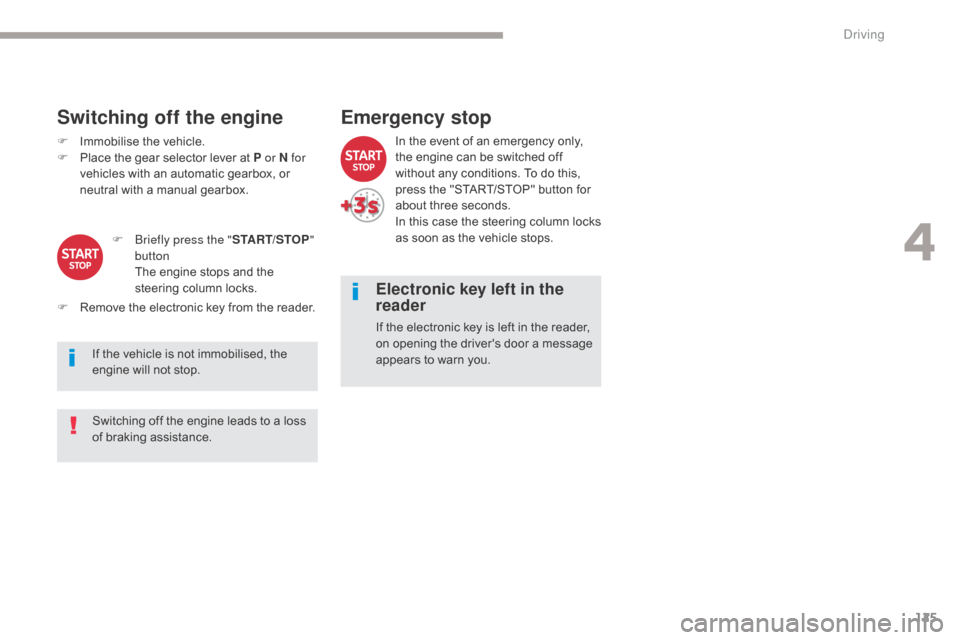
125
Electronic key left in the
reader
If the electronic key is left in the reader,
on opening the driver's door a message
appears to warn you.In the event of an emergency only,
the engine can be switched off
without any conditions. To do this,
press the "START/STOP" button for
about three seconds.
In this case the steering column locks
as soon as the vehicle stops.
Emergency stop
F Immobilise the vehicle.
F
P lace the gear selector lever at P or N for
vehicles with an automatic gearbox, or
neutral with a manual gearbox.
Switching off the engine
If the vehicle is not immobilised, the
engine will not stop. F
B
riefly press the "
START/STOP"
button
T
he engine stops and the
steering column locks.
F
R
emove the electronic key from the reader.
Switching off the engine leads to a loss
of braking assistance.
4
Driving
Page 128 of 523
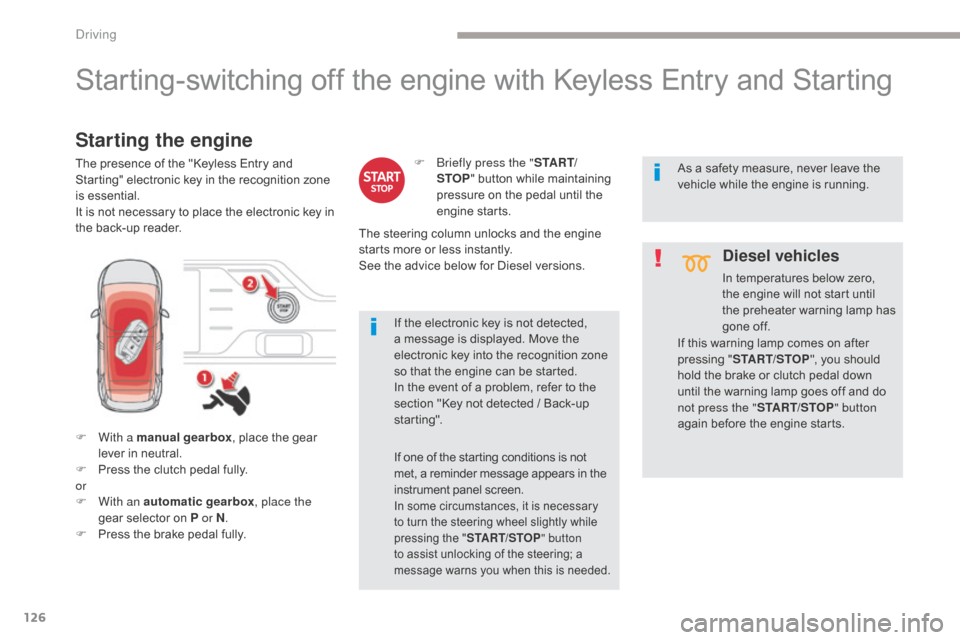
126
Starting-switching off the engine with Keyless Entry and Starting
F With a manual gearbox, place the gear
lever in neutral.
F
P
ress the clutch pedal fully.
or
F
W
ith an automatic gearbox , place the
gear selector on P or N .
F
P
ress the brake pedal fully.
Diesel vehicles
In temperatures below zero,
the engine will not start until
the preheater warning lamp has
gone off.
Starting the engine
The presence of the "Keyless Entry and
Starting" electronic key in the recognition zone
is essential.
It is not necessary to place the electronic key in
the back-up reader. If the electronic key is not detected,
a message is displayed. Move the
electronic key into the recognition zone
so that the engine can be started.
In the event of a problem, refer to the
section "Key not detected / Back-up
starting".F
B riefly press the "
S TA R T/
STOP " button while maintaining
pressure on the pedal until the
engine starts.
If one of the starting conditions is not
met, a reminder message appears in the
instrument panel screen.
In some circumstances, it is necessary
to turn the steering wheel slightly while
pressing the " START/STOP " button
to assist unlocking of the steering; a
message warns you when this is needed.
As a safety measure, never leave the
vehicle while the engine is running.
The steering column unlocks and the engine
starts more or less instantly.
See the advice below for Diesel versions.
If this warning lamp comes on after
pressing "START/STOP ", you should
hold the brake or clutch pedal down
until the warning lamp goes off and do
not press the " START/STOP" button
again before the engine starts.
Driving
Page 129 of 523
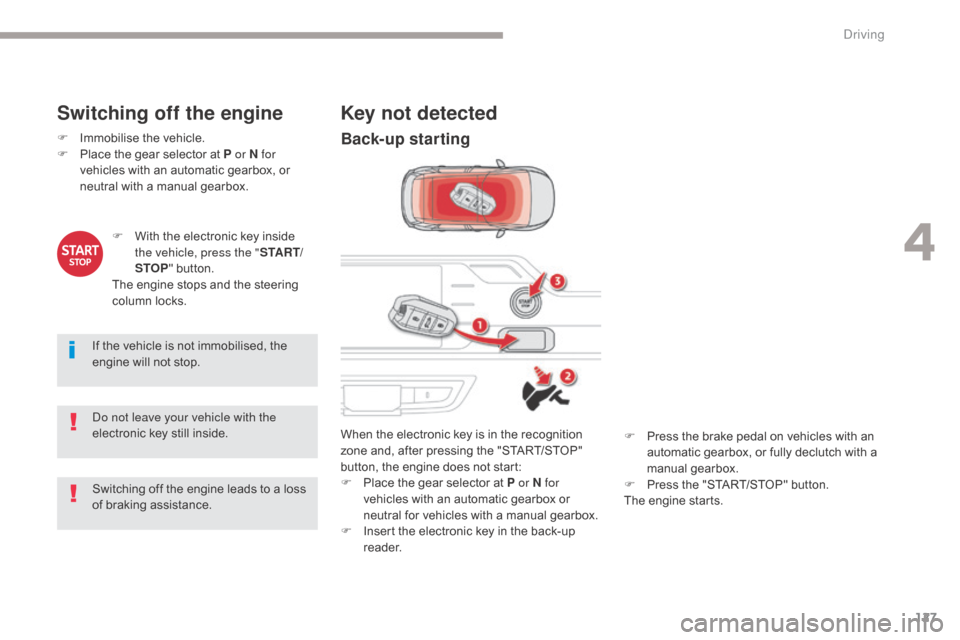
127
Key not detected
When the electronic key is in the recognition
zone and, after pressing the "START/STOP"
button, the engine does not start:
F
P
lace the gear selector at P or N for
vehicles with an automatic gearbox or
neutral for vehicles with a manual gearbox.
F
I
nsert the electronic key in the back-up
reader.
F
W
ith the electronic key inside
the vehicle, press the " S TA R T/
STOP " button.
The engine stops and the steering
column locks.
F
I
mmobilise the vehicle.
F
P
lace the gear selector at P or N for
vehicles with an automatic gearbox, or
neutral with a manual gearbox.
Switching off the engine
If the vehicle is not immobilised, the
engine will not stop.
Do not leave your vehicle with the
electronic key still inside. F
P
ress the brake pedal on vehicles with an
automatic gearbox, or fully declutch with a
manual gearbox.
F
P
ress the "START/STOP" button.
The engine starts.
Switching off the engine leads to a loss
of braking assistance.
Back-up starting
4
Driving
Page 130 of 523
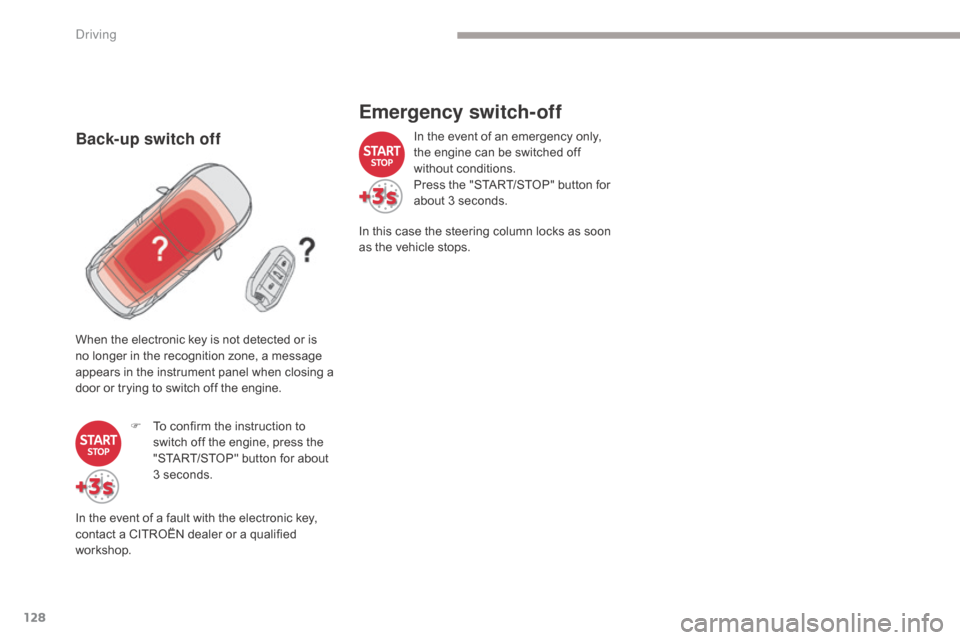
128
When the electronic key is not detected or is
no longer in the recognition zone, a message
appears in the instrument panel when closing a
door or trying to switch off the engine.
Emergency switch-off
In the event of an emergency only,
the engine can be switched off
without conditions.
Press the "START/STOP" button for
about 3 seconds.
In this case the steering column locks as soon
as the vehicle stops.
F
T
o confirm the instruction to
switch off the engine, press the
"START/STOP" button for about
3 seconds.Back-up switch off
In the event of a fault with the electronic key,
contact a CITROËN dealer or a qualified
workshop.
Driving
Page 131 of 523
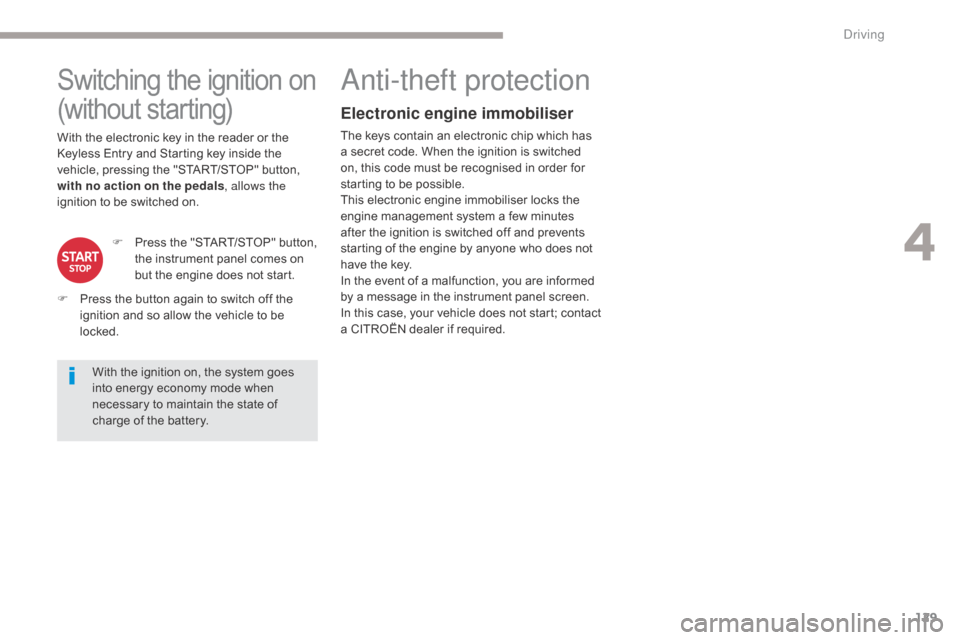
129
Switching the ignition on
(without starting)
With the ignition on, the system goes
into energy economy mode when
necessary to maintain the state of
charge of the battery.
With the electronic key in the reader or the
Keyless Entry and Starting key inside the
vehicle, pressing the "START/STOP" button,
with no action on the pedals
, allows the
ignition to be switched on.
F
P
ress the "START/STOP" button,
the instrument panel comes on
but the engine does not start.
F
P
ress the button again to switch off the
ignition and so allow the vehicle to be
locked.
Anti-theft protection
Electronic engine immobiliser
The keys contain an electronic chip which has
a secret code. When the ignition is switched
on, this code must be recognised in order for
starting to be possible.
This electronic engine immobiliser locks the
engine management system a few minutes
after the ignition is switched off and prevents
starting of the engine by anyone who does not
have the key.
In the event of a malfunction, you are informed
by a message in the instrument panel screen.
In this case, your vehicle does not start; contact
a CITROËN dealer if required.
4
Driving
Page 134 of 523
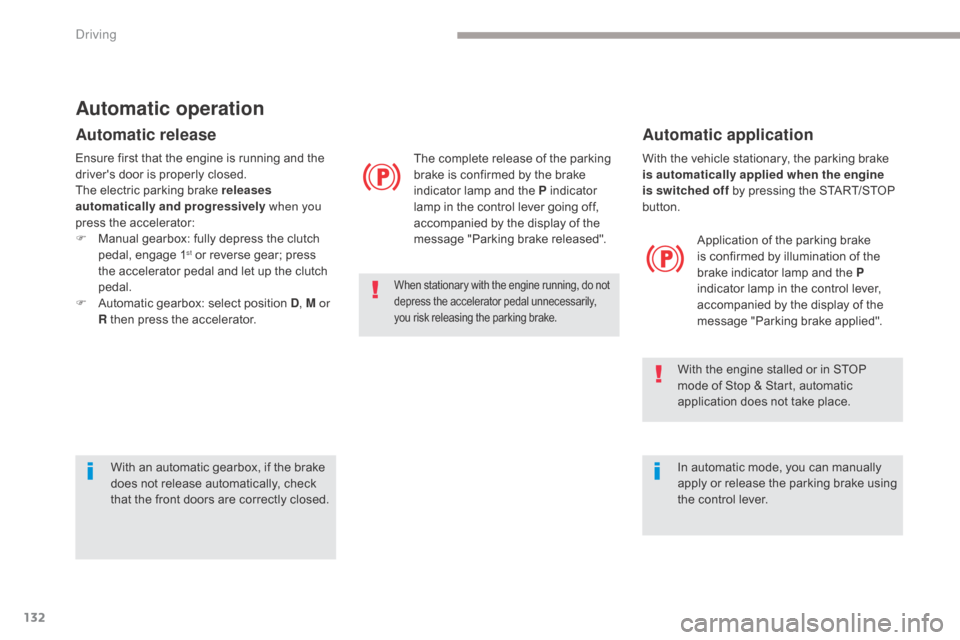
132
With the vehicle stationary, the parking brake
is automatically applied when the engine
is switched off by pressing the START/STOP
button.Application of the parking brake
is confirmed by illumination of the
brake indicator lamp and the P
indicator lamp in the control lever,
accompanied by the display of the
message "Parking brake applied".
With the engine stalled or in STOP
mode of Stop & Start, automatic
application does not take place.
In automatic mode, you can manually
apply or release the parking brake using
the control lever.
Automatic operation
Automatic release
The complete release of the parking
brake is confirmed by the brake
indicator lamp and the P indicator
lamp in the control lever going off,
accompanied by the display of the
message "Parking brake released".
When stationary with the engine running, do not
depress the accelerator pedal unnecessarily,
you risk releasing the parking brake.
Ensure first that the engine is running and the
driver's door is properly closed.
The electric parking brake releases
automatically and progressively when you
press the accelerator:
F
M
anual gearbox: fully depress the clutch
pedal, engage 1
st or reverse gear; press
the accelerator pedal and let up the clutch
pedal.
F
A
utomatic gearbox: select position D , M or
R then press the accelerator.
Automatic application
With an automatic gearbox, if the brake
does not release automatically, check
that the front doors are correctly closed.
Driving
Page 147 of 523
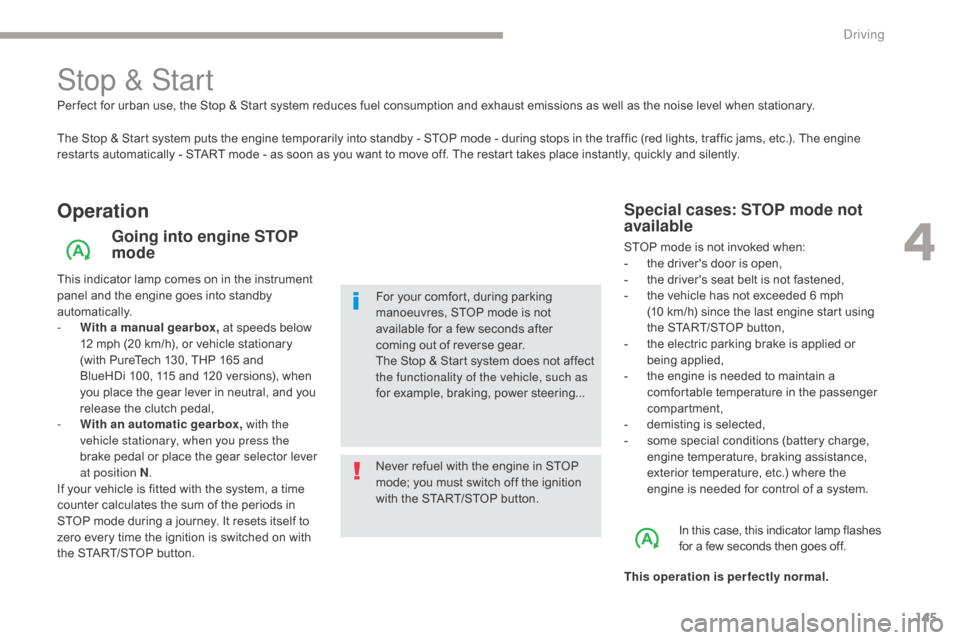
145
Stop & Start
The Stop & Start system puts the engine temporarily into standby - STOP mode - during stops in the traffic (red lights, traffic jams, etc.). The engine
restarts automatically - START mode - as soon as you want to move off. The restart takes place instantly, quickly and silently.
Operation
Going into engine STOP
mode
This indicator lamp comes on in the instrument
panel and the engine goes into standby
automatically.
-
W
ith a manual gearbox, at speeds below
12 mph (20 km/h), or vehicle stationary
(with PureTech 130, THP 165 and
BlueHDi
100, 115 and 120 versions), when
you place the gear lever in neutral, and you
release the clutch pedal,
-
Wi
th an automatic gearbox, with the
vehicle stationary, when you press the
brake pedal or place the gear selector lever
at position N .
If your vehicle is fitted with the system, a time
counter calculates the sum of the periods in
STOP mode during a journey. It resets itself to
zero every time the ignition is switched on with
the START/STOP button. Never refuel with the engine in STOP
mode; you must switch off the ignition
with the START/STOP button. For your comfort, during parking
manoeuvres, STOP mode is not
available for a few seconds after
coming out of reverse gear.
The Stop & Start system does not affect
the functionality of the vehicle, such as
for example, braking, power steering...
Special cases: STOP mode not
available
STOP mode is not invoked when:
-
t he driver's door is open,
-
t
he driver's seat belt is not fastened,
-
t
he vehicle has not exceeded 6 mph
(10
km/h) since the last engine start using
the START/STOP button,
-
t
he electric parking brake is applied or
being applied,
-
t
he engine is needed to maintain a
comfortable temperature in the passenger
compartment,
-
d
emisting is selected,
-
s
ome special conditions (battery charge,
engine temperature, braking assistance,
exterior temperature, etc.) where the
engine is needed for control of a system.
In this case, this indicator lamp flashes
for a few seconds then goes off.
This operation is perfectly normal.
Per fect for urban use, the Stop & Start system reduces fuel consumption and exhaust emissions as well as the noise level when stationary.
4
Driving
Page 149 of 523

147
Operating fault
Have it checked by a CITROËN dealer or a
qualified workshop.
In the event of a fault in STOP mode, the vehicle
may stall.
All of the instrument panel warning lamps come on.
Depending on version, an alert message may also
be displayed, asking you to place the gear selector
lever at position N and put your foot on the brake
pedal.
It is then necessary to switch off the ignition and
start the engine again using the "START/STOP"
button.
In the event of a fault with the system,
this indicator lamp flashes for a few
moments then comes on continuously,
accompanied by a message.
Opening the bonnet
Before doing anything under the
bonnet, deactivate the Stop & Start
system to avoid the risk of injury related
to an automatic change to START
mode.
Driving on flooded roads
Before driving through a flooded road,
it is strongly recommended that you
deactivate the Stop & Start system.
For more information on Driving
advice
, particularly on flooded roads,
refer to the corresponding section. The Stop & Start system requires a
battery of advanced technology and
special characteristics.
All work on this type of battery must
only be done by a CITROËN dealer or a
qualified workshop.
For more information on the 12 V
battery
, refer to the corresponding
section.
4
Driving
Page 158 of 523

156
Steering mounted controls
6. Cruise control pause / resume indication.
7. Cruise control mode selection indication.
8.
Spe
ed setting.
Cruise control - "CRUISE"
System which automatically maintains the speed of the vehicle at the value programmed by the driver, without any action on the accelerator pedal.
The cruise control system cannot, in any circumstances, replace the need to observe speed limits, nor can it replace the need for vigilance on the part of the driver.
You are advised to keep your feet near the pedals at all times.
S
witching on the cruise control requires a
minimum vehicle speed of 25 mph (40 km/h).
As well as engagement of:
-
f
ourth gear or higher on a manual gearbox,
-
s
econd gear or higher in manual mode on
an automatic gearbox,
-
position
D on an automatic gearbox.
The system remains active after changing gear
on vehicles with a manual gearbox and Stop &
Start.
The cruise control is paused by pressing
button 4 or the brake pedal or on triggering of
the ESC system for safety reasons.
It is possible to exceed the programmed speed
temporarily by pressing the accelerator pedal.
To return to the programmed speed, simply
release the accelerator pedal until the
programmed cruise speed is reached again. 1.
S
elect cruise control mode.
2.
S
et the current speed of the vehicle
as the programmed speed / Lower the
programmed speed.
3.
S
et the current speed of the vehicle
as the programmed speed / Raise the
programmed speed.
4.
P
ause / resume cruise control.
5.
D
isplay the list of memorised speeds or,
A
ccept the speed suggested by the speed
limit recognition system.
Displays in the instrument panel
Switching off the ignition cancels any
programmed speed value. For more information on Memorising speeds
,
refer to the corresponding section.
For more information on Speed limit
recognition and memorisation, refer to the
corresponding section.
Driving
Page 162 of 523
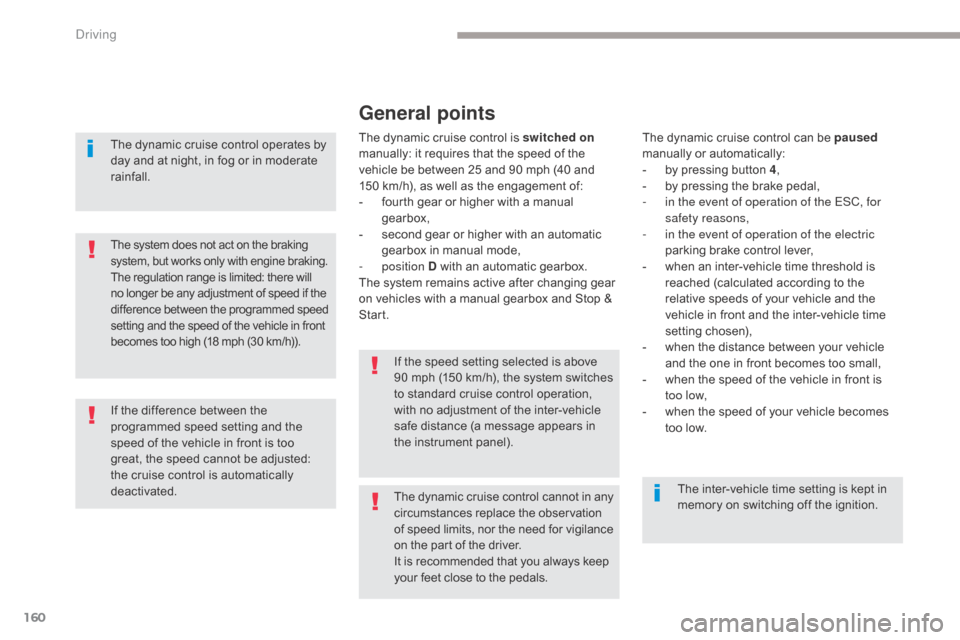
160
The dynamic cruise control is switched on
manually: it requires that the speed of the
vehicle be between 25 and 90 mph (40 and
150
km/h), as well as the engagement of:
-
f
ourth gear or higher with a manual
gearbox,
-
s
econd gear or higher with an automatic
gearbox in manual mode,
-
position D with an automatic gearbox.
The system remains active after changing gear
on vehicles with a manual gearbox and Stop &
Start.
General points
The dynamic cruise control can be paused
manually or automatically:
-
b
y pressing button 4 ,
-
b
y pressing the brake pedal,
-
i
n the event of operation of the ESC, for
safety reasons,
-
i
n the event of operation of the electric
parking brake control lever,
-
w
hen an inter-vehicle time threshold is
reached (calculated according to the
relative speeds of your vehicle and the
vehicle in front and the inter-vehicle time
setting chosen),
-
w
hen the distance between your vehicle
and the one in front becomes too small,
-
w
hen the speed of the vehicle in front is
too
low,
-
w
hen the speed of your vehicle becomes
too low.
The dynamic cruise control cannot in any
circumstances replace the observation
of speed limits, nor the need for vigilance
on the part of the driver.
It is recommended that you always keep
your feet close to the pedals. If the speed setting selected is above
90 mph (150 km/h), the system switches
to standard cruise control operation,
with no adjustment of the inter-vehicle
safe distance (a message appears in
the instrument panel). The inter-vehicle time setting is kept in
memory on switching off the ignition.
The dynamic cruise control operates by
day and at night, in fog or in moderate
rainfall.
The system does not act on the braking
system, but works only with engine braking.
The regulation range is limited: there will
no longer be any adjustment of speed if the
difference between the programmed speed
setting and the speed of the vehicle in front
becomes too high (18 mph (30 km/h)).
If the difference between the
programmed speed setting and the
speed of the vehicle in front is too
great, the speed cannot be adjusted:
the cruise control is automatically
deactivated.
Driving